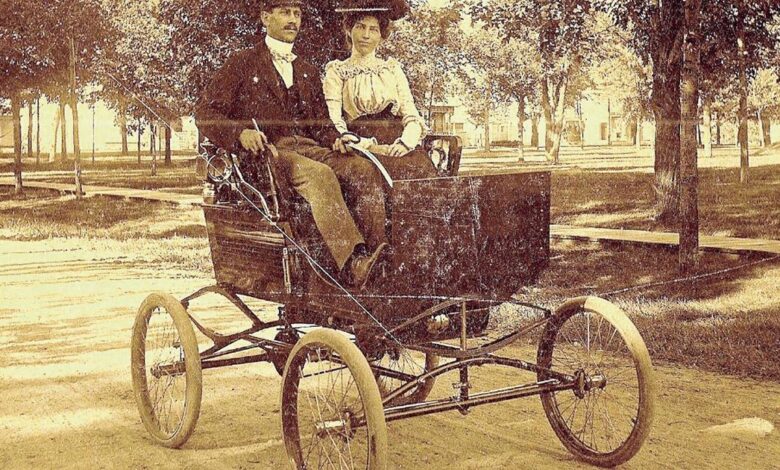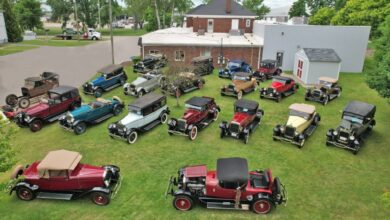Throwback Thursday: Ripon & Berlin business partners build early automobiles | News

Berlin’s first-ever motorized car, owned by Ed Deibler, drives around the city in 1903. This appears to be a park-like background, including a dirt road with wooden sidewalks.
“The Standard Catalog of American Cars 1805-1942” is written by researchers and historians at Krause Publications in Iola, Wis. It also is the sponsor of and home to one of the largest vintage car shows in the United States.
The catalog reflects Krause’s vehicle knowledge, experience and collected information.
Listed within the catalog’s chronology of early automobiles are Ripon and Berlin business partners who built cars that were driven in the two communities.
About the business partnerships
Bicycles and two-seater automobiles are displayed in front of the S.B.D. Deibler family bicycle shop in Berlin. Ed Deibler, aspiring automobile builder, worked here while also assembling hand-built cars.
Deibler & Johnson Automobile Co. started assembling cars in Berlin in 1900 by manufacturing its own car parts on a small scale.
The Deibler family owned a bicycle shop in Berlin, which may have contributed to their expertise in machine shop and manufacturing parts, plus assembly.
Deibler & Johnson organized a stock company that could have been owned by a number of investors. Motor Age Magazine’s Summer 1908 issue quoted that the “Deibler & Johnson partnership would eventually go into the automobile manufacturing business on an extensive scale.”
One of the partners, Ed Deibler (1868-1947) of Berlin, completed building a car in 1908 and then he had the business name changed to “Russell-Deibler,” no longer “Deibler & Johnson.”
Russell-Deibler Automobile Manufacturing was in business from 1908 until 1909. Frank Russell (1869-1924) was a business owner manufacturing gloves in Berlin. Early-automobile enthusiasts, in addition to their day jobs, the two decided that they would build cars together.
Their first hand-built auto was a small two-seater “touring car,” completed in 1908. Their second automobile was a more ambitious 116-inch wheelbase four-cylinder 40-horsepower, Rutenber engine, four-seater car that was finished and in use late December that same year. The larger four-seater car was reportedly sold to the mayor of Ripon.
Russell-Diebler realized its business could not be a serious endeavor due to the scale of handiwork and machinery needed to complete cars — although the Berlin Evening Journal newspaper stated in 1909 that “Russell was selling his own personal 40-horsepower Pope-Toledo car, a four-wheel front-engine automobile that he had purchased and was manufactured in Ohio, because he (Russell) preferred driving his very-own self-manufactured cars (instead).”
At that same time, Russell was developing another six-cylinder car concept, but his automobile activity came to an abrupt halt.
The reason being, Russell invited a Ripon auto enthusiast, William Schaefer (who had built one car of his own), to assist with a carburetor problem.
While working together Russell and Schaefer accidentally broke a headlamp bulb near a gasoline carburetor and oil-soaked workshop floor which caught fire, causing Russell’s Glove factory to burn to the ground in 1910.
This postcard photo shows the Russell Glove Co. burning in 1910 due to an accident while working on a hand-built automobile. Forty-two thousand gloves and mittens were destroyed in the blaze.
Russell ceased work on cars and instead focused on rebuilding his glove factory business at the corner of West Park Avenue and North Capron Street.
Personal lives and interests
Deibler was born in Berlin and his family lived at 107 Webster St. and later moved to Washington Street. Deibler spoke German and English, and as an adult was known throughout Berlin for walking around with a live parrot on his shoulder.
The U.S. Federal Census lists Deibler working as a school teacher and a bike shop clerk.
In 1893, he married Verne Elmer (1867-1947) and lived with her parents at 425 East Ceresco St. They divorced in 1920. Deibler moved to Chicago where he died in May 10, 1928. He is buried in Oakwood Cemetery in Berlin.
Niels Johnson (1841-1905) started his own machine shop and foundry specializing in metal works, blacksmithing and repairs.
Immigrating from Denmark, Johnson served in the American Civil War starting in 1861 and mustered out with a disability in 1863.
Relocating to Ripon, Johnson operated a machine shop. In 1880, he returned to Berlin to open yet another machine shop business at the corner or Park Avenue and Water Street. Niels and his family members are buried in Oakwood Cemetery in Berlin.
Russell was born in Poygan, Wis. The oldest of three children, Russell attended Berlin schools.
His first business job as a newspaper delivery boy for the Berlin Journal in 1882 paid 60 cents per week (which equals $18.06 today). He then became a grocery store clerk, earning $10 a month (which equals $333.72 today). In 1891, he became a partner and eventual owner of the Russell Glove manufacturing business.
Later, Russell’s brother owned the W.C. Russell Moccasin company, which still is in business today at 285 SW Franklin St., Berlin. Russell and his family members are buried in Oakwood Cemetery in Berlin.
Schaefer (1857-1926), owned a Ripon garage, and started the Berlin Foundry Corp. in 1908.
Later known as the Schaefer Manufacturing Co., with financial backing from four individuals, Schaefer built engines for trading vessel boats on the Fox River.
Schaefer and his family members are buried in St. Patrick’s Catholic Cemetery in Ripon.
The Ripon Historical Society is the oldest continually operating historical society in Wisconsin. It is open Fridays and Saturdays 10 a.m. to 1 p.m.
For more information follow us at Facebook/riponhistory or www.riponhistory.org.



